Sound and the Fury: Living With Noise Pollution in Beirut
Noise
Noise Pollution
“My children jump out of fear every time a truck passes by, it’s like we live on the street,” says Amira, 53, who lives with her family in a building in Dawra, where her husband works as a concierge. Amira's case is far from isolated. Most of Beirut’s streets and neighborhoods are exposed to harmful noise levels, an unbearable situation that has affected the lives of most residents of the city, and some more than others.
“Our relationship with silence is not very present unless you live in a remote area,” says Karim Nammour, a lawyer and legal researcher at research and advocacy organization Legal Agenda. “Silence is really reserved to the privileged few.”
While the concept of a “right to silence” does not exist in law, he considers it to be integral to development because people need quiet to be able to rest, think, recharge, and be productive.
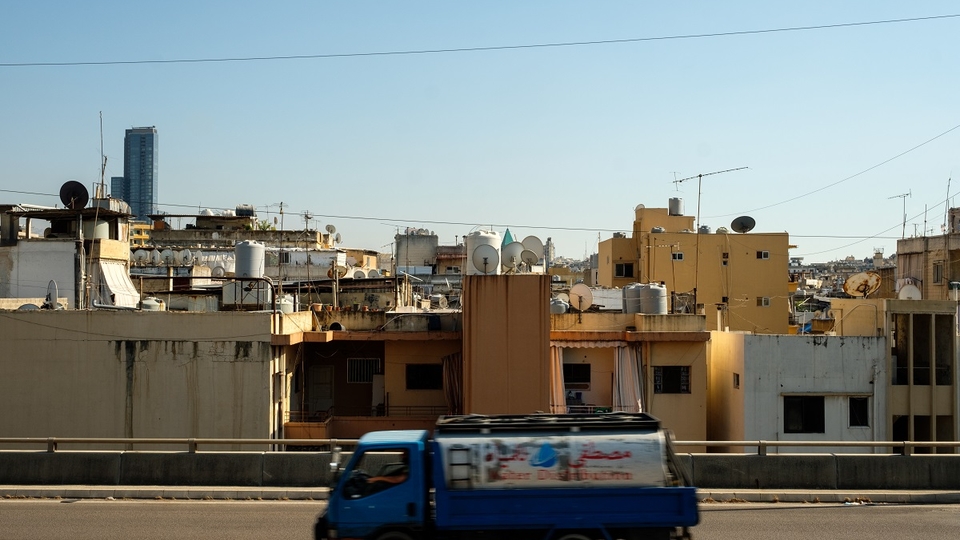
A water truck crosses the Yerevan highway, elevated above a residential neighborhood in Bourj Hammoud. Beirut, Lebanon. July 4, 2022. (Rita Kabalan/The Public Source)
A study published in 2011 showed that noise levels in the Lebanese capital were four times higher than the maximum standard level decibels recommended by the World Health Organization. In 1999, the WHO concluded that “noise [is] an increasingly recognized global problem with consequential effects on life quality.”
Walking from Dawra to the industrial city, Bourj Hammoud, then Mar Mikhael, one is exposed to myriad disorienting noises that form the sonic landscape of Beirut. In the absence of effective urban planning, and amid systematic neglect from the government, the residents of these neighborhoods are constantly subjected to the commotion of daily life, industry, churning engines and generators, adding sensory overstimulation and anxiety to their already stressful lives.
Dawra Traffic
The sound of Dawra's traffic
A Choice Between Fresh Air and Fuel
Dawra is sometimes described as the center of the northern suburbs of Beirut. In the absence of a formal public transportation network, Dawra’s roundabout became a bus station, where buses, vans, and taxis gather round the clock, polluting the area with a cacophony of honks and motors.
The traffic is unbearable for the residents in this area, many of whom are refugees and migrant workers.
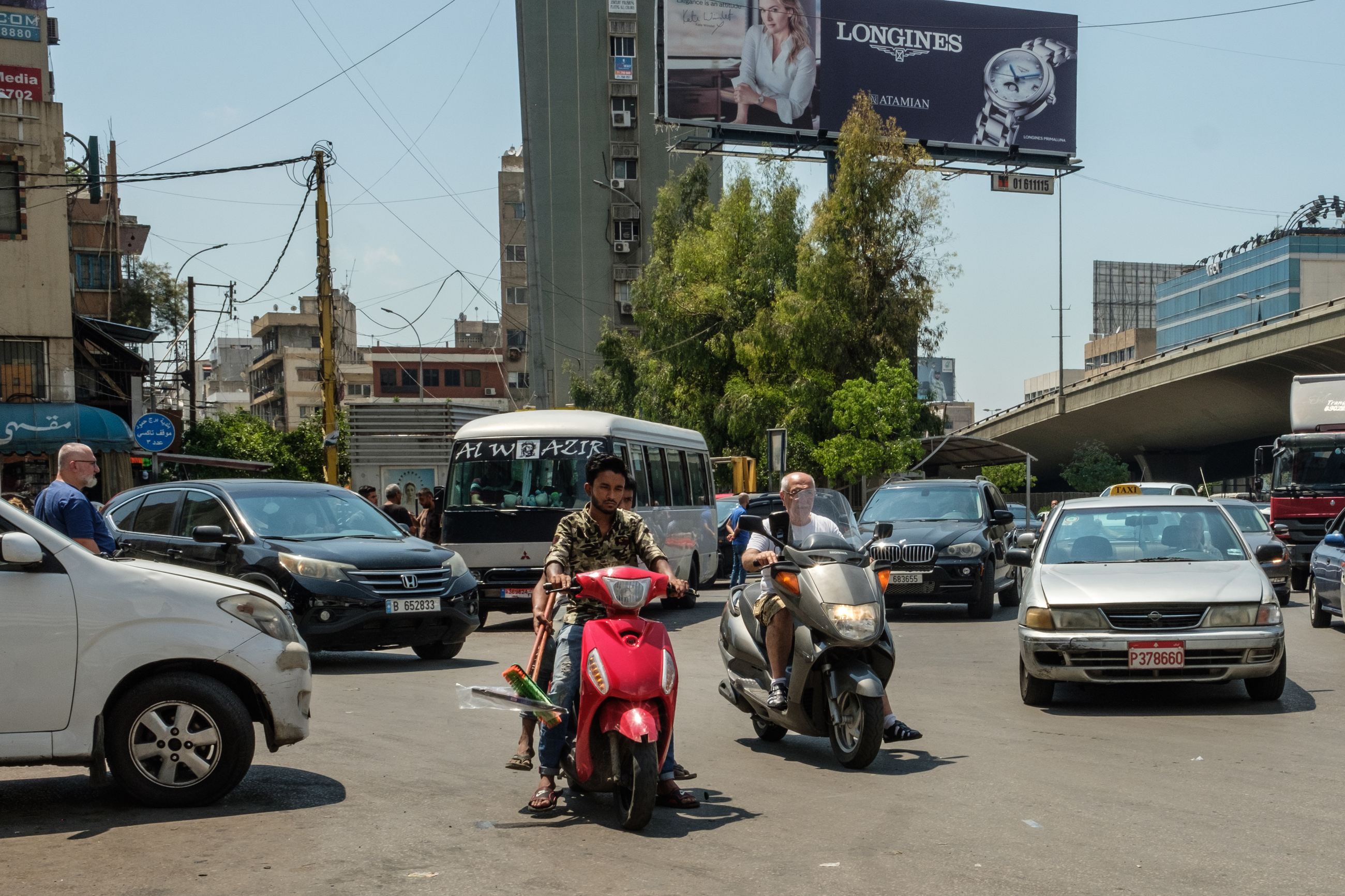
The Dawra roundabout packed with cars and motorcycles during rush hour. Beirut, Lebanon. July 4, 2022. (Rita Kabalan/The Public Source)
Maza, 39, is an Ethiopian woman living with her husband in Dawra. She cooks Ethiopian food at a small snack stall. “My son is 17 years old and sometimes he can’t study, so I have to send him elsewhere so he can focus,” she says. “Everything in Dawra is noise.”
Maza expresses how on hot nights her family can hardly sleep. She’s often forced to choose between a bad and a worse scenario — open the windows for some air, or keep them shut to block a noise and fume invasion of the bedroom?
Factories
Between the Residential and the Industrial
An industrial zone is located between Dawra and Bourj Hammoud, and despite being only a few streets long, it emits a lot of noise. There, you can find wholesale shops that sell car parts and toolkits, but also car repair and other workshops and factories that operate on the ground floors of residential buildings.
Nathalie, 44, lives right above a carpentry factory facing a steel workshop. She does not open any of the windows until late in the afternoon, waiting for the factory and workshop to close for the day.
Sometimes, her wait continues until the evening, if laborers are working late on a project. “When they stay here this late, I feel like I just want to go out and start yelling at them, but I know I can’t,” she says, shaking her head.
“The sound that bothers me the most is the sound of the saw that the carpenter uses,” she continues. “Once it’s on, it’s never off!” The noise she hears most during the day is that of the electric screwdriver from the nearby car repair garages.
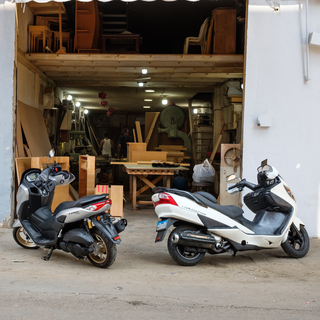
Two men converse outside a carpentry workshop while a carpenter does woodwork inside. Beirut, Lebanon. July 4, 2022. (Rita Kabalan/The Public Source)
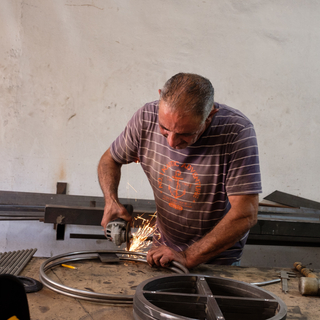
An ironworker concentrates on cutting a steel cylinder in his workshop. Beirut, Lebanon. July 4, 2022. (Rita Kabalan/The Public Source)
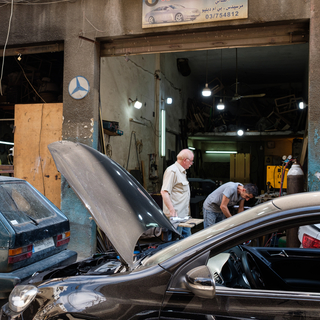
A man brings his car in for repairs while keeping a close eye at the mechanic’s work in the garage. Beirut, Lebanon. July 4, 2022. (Rita Kabalan/The Public Source)
Nathalie recognizes the tools handled in the vicinity from the noise they emit, and expresses how they interrupt her biological clock. “I know these sounds very well. They wake me up everyday and I don’t have a choice to sleep in the morning. I have to wake up with them daily.”
Her daughter, Marielle, 16, evokes a similar experience, while describing how she sometimes feels like she’s suffocating to study. “I can’t focus when I’m studying because of the noise. But when I close the windows, I feel the heat because we don’t have electricity most of the time [to turn on the air conditioner].”
Highway
Highway to Hell
Yerevan Street in Bourj Hammoud is located under Yerevan Bridge, connecting Dekwaneh to Ashrafieh. This Dar al-Handasah project was built in the span of eight years, between 1997-2004, and required buildings to be demolished around Yerevan Street.
The bridge is so tightly nestled between residential buildings that passing cars are but a stone’s throw away from balconies. “If a car got into an accident, it would end up in my living room!” exclaims 44-year-old Micheline, who has been living in one of the buildings that faces the highway for almost 20 years.
Besides its dangerous proximity to people’s homes, the constant noise is also nerve-racking. “I am so stressed all the time. [...] Sometimes when I’m talking with someone, I start screaming without noticing, and it makes me feel so bad. I also get angry easily now and I can’t do anything about it.”
In addition to danger and noise, there’s also pollution. “When I wash my clothes, I have to dry them inside and close the curtains too; otherwise they will smell like diesel and feel like sand,” she continues.
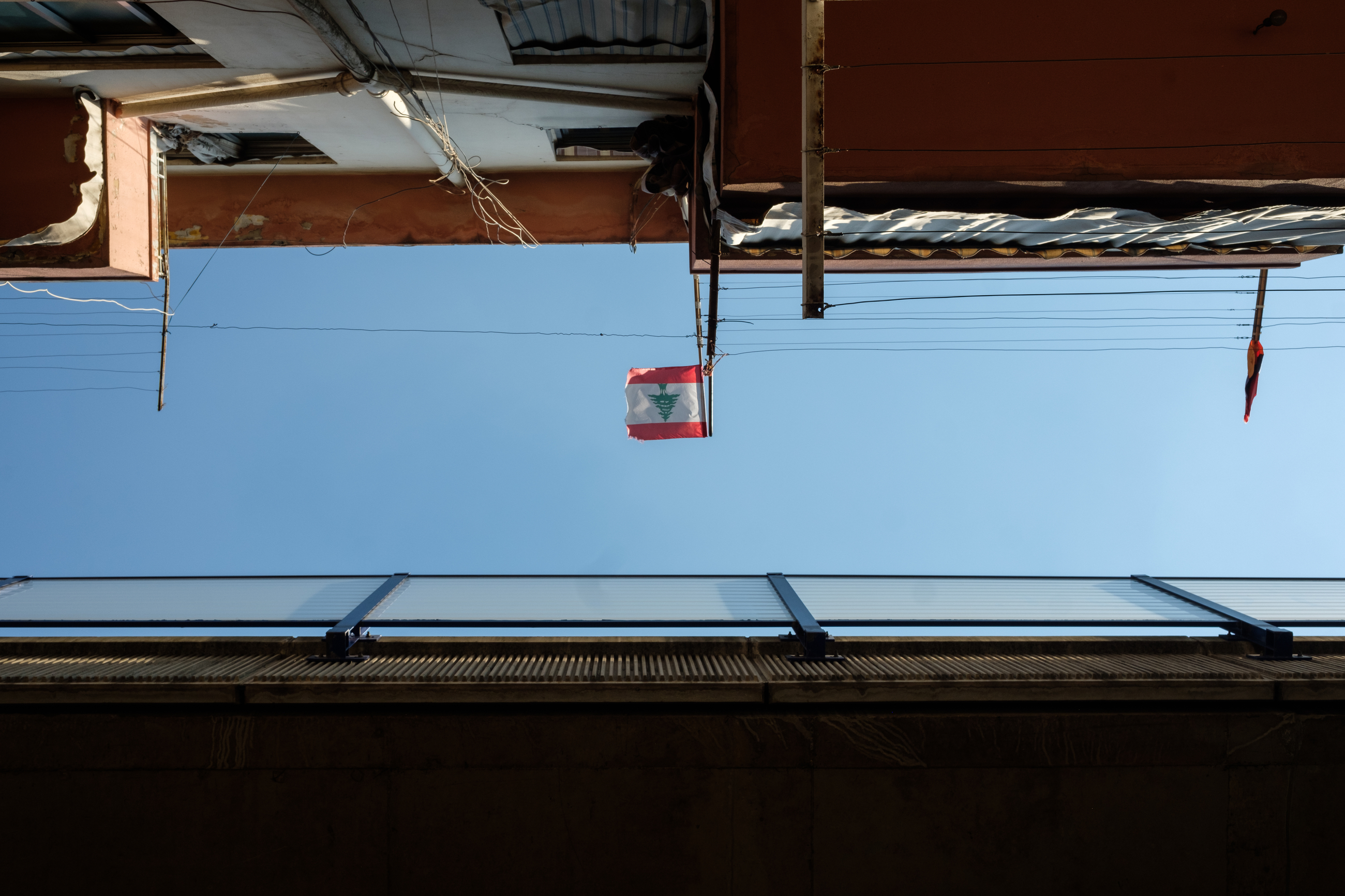
The Yerevan Bridge passes right in front of the balcony of an apartment building in Bourj Hammoud, a Lebanese flag waving close to the highway. Beirut, Lebanon. July 4, 2022. (Rita Kabalan/The Public Source)
Micheline has been trying to leave the area for years now, but it hasn’t been easy. “I put this house up for sale six years ago, but no one wants to buy it. Who would want to live here?” The bridge brought along a depressing urban blight with which she feels stuck. “Most of my neighbors left and rented their houses. No one is happy here.”
Abir Saksouk, an urban planner and a co-director of Public Works Studio, is critical of projects like this bridge. “The government’s so-called civil planning is only a tool to achieve the interests of investors with the support of the ruling elite,” she tells The Public Source. Yerevan Bridge exemplifies how infrastructure goes wrong when it prioritizes profit at the expense of people.
Micheline remembers when the plan to build the highway became public, residents of the neighborhood signed a petition opposing the highway’s construction. “But the government decided to build this here anyway. The decision was taken and we didn’t have a say in it. We can’t fight back and we can’t ask for compensation, or any other support really.”
Generators
A Stream of Constant Buzzing
One sound that’s been consistent throughout the journey across Beirut is the intense noise of generators. In a city that lacks almost all essential public services necessary for a decent living, residents keep turning to so-called alternatives, including private generators, to compensate for the near-total absence of state-provided electricity.
“It’s all about the electricity,” for Maza. The worst of Beirut’s deafening din is the sound of generators, especially at night. She believes that part of the city’s noise pollution could be addressed if politicians resolved the endless power shortages.
Micheline echoes Maza. The sound of the electricity generators that operate under her bedroom window saturate her house day in, day out. “It’s the most present noise in the house.”
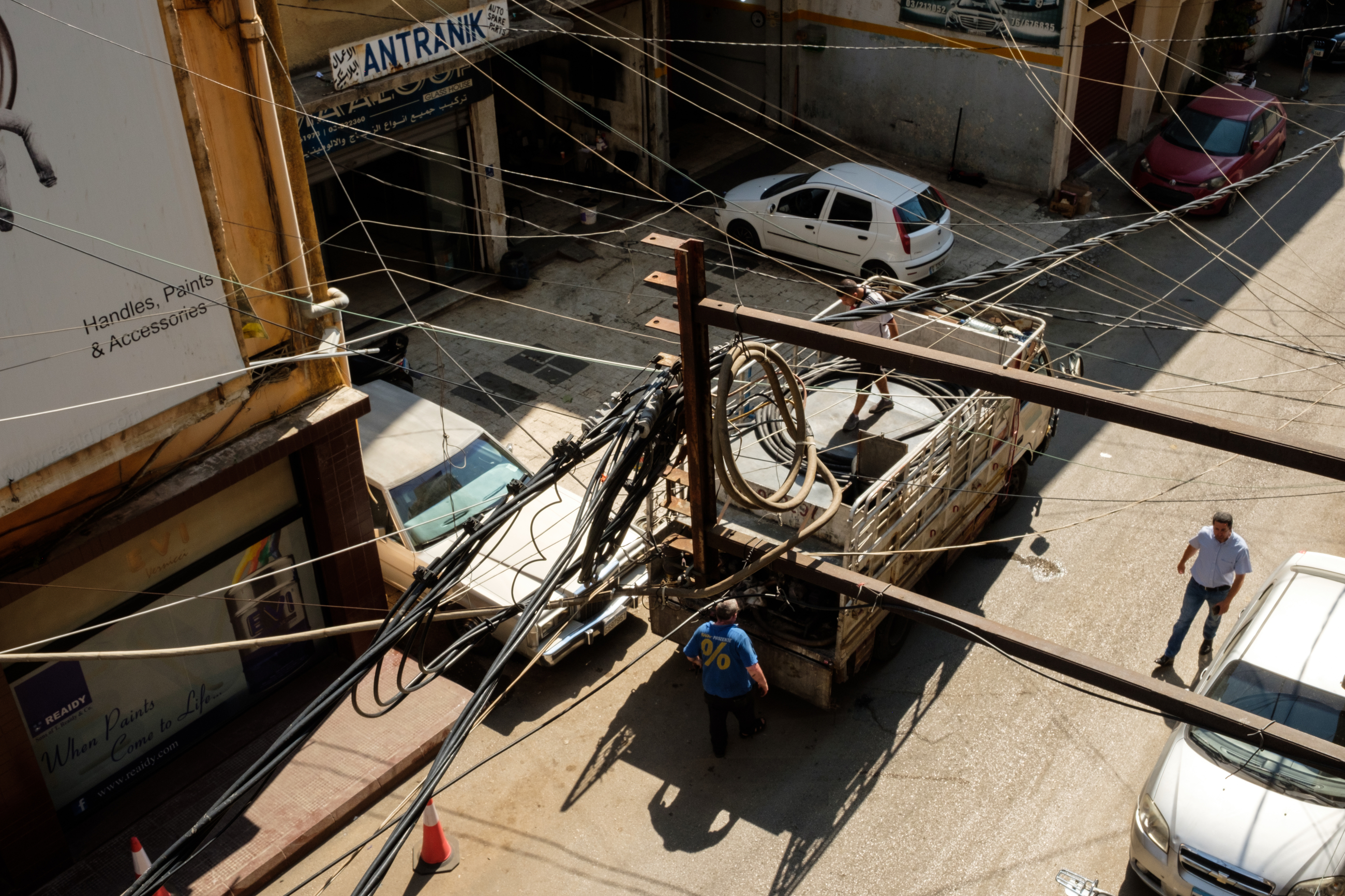
Electric cables hang from Nathalie’s balcony, while a water truck fills a tank in the building across from hers. Beirut, Lebanon. July 4, 2022. (Rita Kabalan/The Public Source)
Generators of this kind are not the only ones operating in the city. As Beirut faces acute water shortages, either from malfunctions in the primary water line or from lack of fuel, the droning generator of the “citerne” is perhaps the loudest during the day.
“[The citerne] is here all day long, and the noise is so loud, it makes me crazy,” Nathalie complains, referring to the local water distributor. Hundreds of informal private water suppliers roam the streets one by one. The exhausting noise of their generators mingles with the existing discordance in every street, building, apartment, and tank, one home at a time.
Bar Street
One Big Open-Air Club
At the end of Bourj Hammoud begins another historically residential and industrial neighborhood, Mar Mikhael, along Armenia Street that leads to Gemmayzeh, another residential area. Today, the residents of Mar Mikhael are waging a fierce battle for sleep against the invasion of bars and clubs.
Many of these bars once again took up the ground floors of residential buildings after the traumatic August 4, 2020, explosion, blasting their loud music throughout the night on the same streets and buildings that were damaged.
Annie, 56, has lived in the same home in Gemmayzeh since she was born. She expresses how “the street itself is home.” Standing on the balcony of her apartment on the third floor, Annie points to the nearby bars, where thumping music, raucous conversations, and laughter rise through the air and into the night. “I feel like my ears are under assault every night. To be able to sleep, I take a pill every night, and sometimes they still manage to wake me up!”
Residents of this area have been organizing for many years under the banner “Mar Mikhael My Homeplace,” demanding the municipality to take action to curb the noise. The municipality of Beirut is in charge of protecting residents, according to Saksouk.
“When it comes to the generators, bars, or anything that threatens the safety of the residents in the city or disturbs them, it is the legal responsibility of the Beirut municipality to maintain their safety, whether it is about noise, pollution, or health,” the urban planner says.
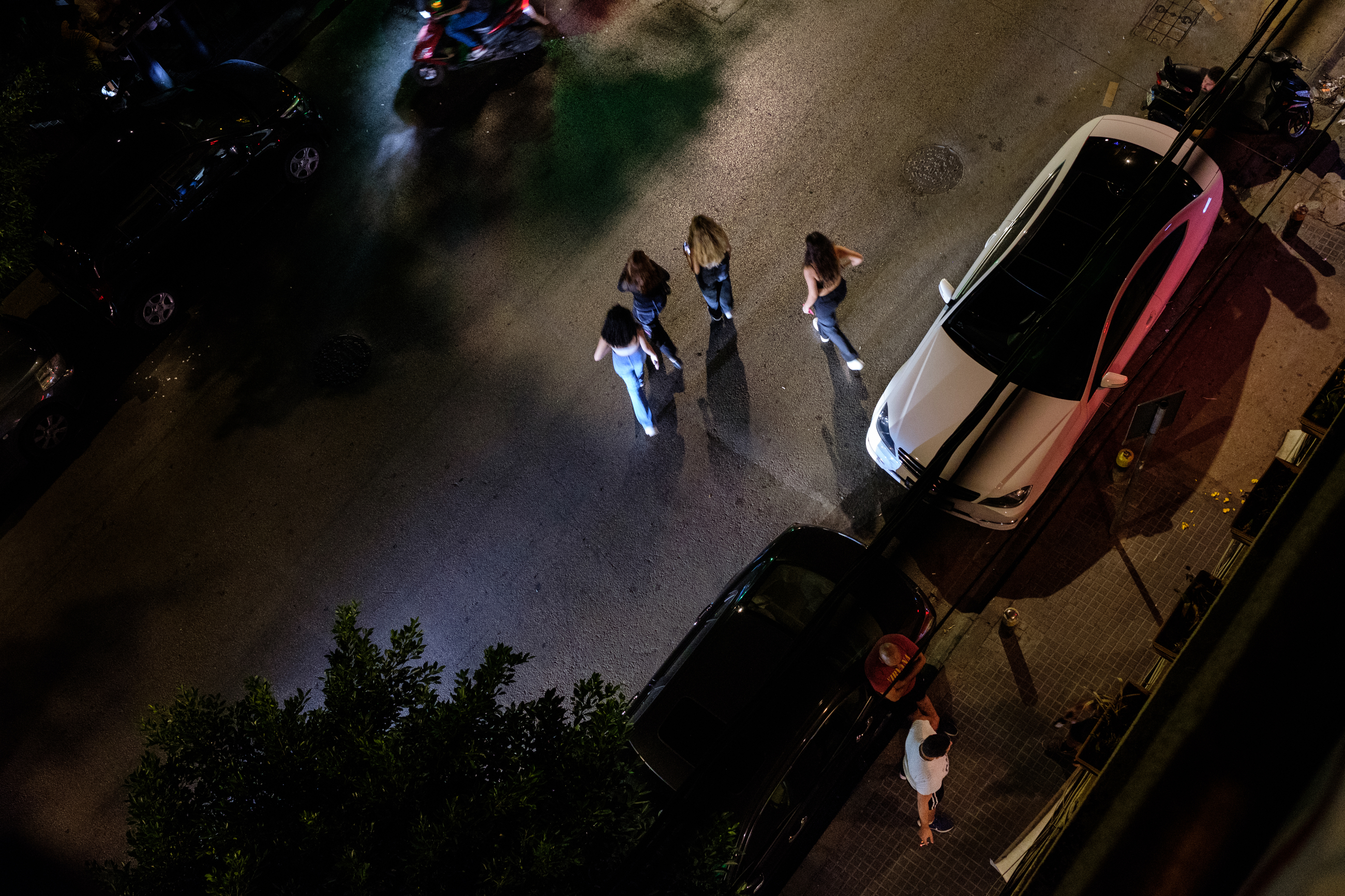
Four women cross the street in the vibrant neighborhood of Gemmayzeh, which was heavily destroyed by the Beirut blast on August 4, 2020. The street is filled with bars and lit by car lights. Beirut, Lebanon. July 4, 2022. (Rita Kabalan/The Public Source)
But so far, Beirut’s municipality has not implemented any serious decisions to protect the resident from noise pollution.
Emily, one of the organizers of "Mar Mikhael My Homeplace," lives in an old house in Gemmayzeh with her sister and her elderly mother. Standing in her small garden, she points to the generators whirring in the back. “The [nearby hotel] generators make us feel like we constantly live in an airplane reactor. We can’t sit outside in the heat, and we can’t sleep,” the middle-aged woman says. “They took my garden away from me.”
Nammour tells The Public Source that justice is not accessible to everyone. The residents of Mar Mikhael are facing people who have much more money than they do.
“Before Mar Mikhael got gentrified, it was an industrial sector of the city,” he explains.“Most of the families who used to work in those factories lived in that area. And this is why they cannot really afford a legal battle.”
Pierre, 61, lives in his old family house facing the Électricité Du Liban building in Mar Mikhael. “The house shakes because of the different noises,” he tells The Public Source while pointing to the cars from his balcony.
His house was severely damaged by the Beirut Port explosion that left his mother gravely wounded. “This neighborhood is still suffering until today [because of the explosion], people partying here are showing no respect to the dead, the suffering families, and to everything we’ve been through,” he says.
Annie wonders, “do they want to displace us again?” But despite the late-night commotion, she is determined not to leave her home.